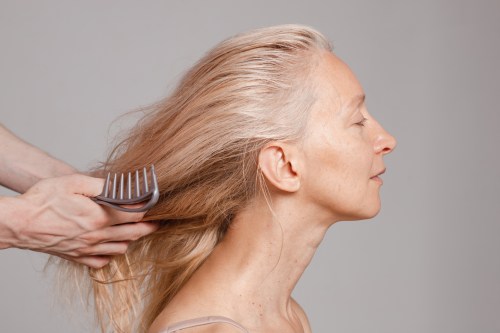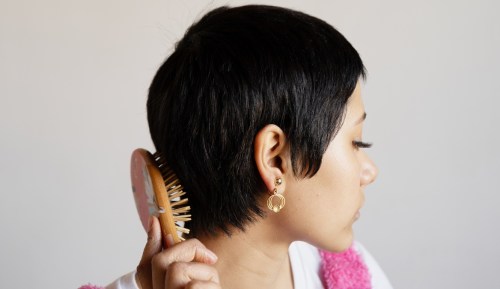Desperate times call for desperate measures, and if you’ve ever run out of body wash mid-shower and used shampoo on more than just your hair, you know what we mean. Although you can use your hair-care product as body wash, considering they both get you clean, whether you should is a whole other matter. We spoke to board-certified dermatologists Blair Murphy-Rose, MD and founder of Facet Dermatology Geeta Yadav, MD to find out whether you can use shampoo as body wash (or vice versa)—and if not, what to use instead.
Experts in This Article
founder of S.W. Basics and author of Skin Cleanse
board-certified dermatologist in New York City
board-certified dermatologist and founder of FACET Dermatology
hair health expert and trichologist
What is shampoo?
Shampoo is a cleanser that removes dirt, oil, and residue from the hair, and according to Dr. Yadav, shampoos typically contain “cleansing agents”—or what is otherwise known as surfactants—that strip these impurities from the strands and scalp. While shampoos all work to this effect, they also come in various formats and formulations. For instance, there are liquid shampoos and solid shampoo bars, and formulas made for a wide range of needs, like shampoos for oily scalps and shampoos for sensitive skin.
What is body wash?
Body wash is cleanser for the skin from the neck down, and like shampoo, it also contains surfactants, says Dr. Yadav. However, body wash typically contains more surfactants than shampoos, as “[it] is designed to be used to break down and wash away body oils,” she says. Just as there are an array of shampoos, there are many variations of body wash, including body wash for sensitive skin, body wash for body odor, and if you’re concerned about the environment as much as your skin, eco-friendly body wash, too.
Shampoo versus body wash: similarities and differences
Despite the many variations available, shampoo and body wash will both get you clean—and according to Dr. Murphy-Rose, their chemical structures are more similar than different. “Shampoos and body washes both usually contain surfactants that mix well with oils and then easily rinse away with water to remove those oils,” she says.
However, beyond these similarities, shampoo usually has lower levels of surfactants than body wash. “We typically want to remove less of the oils on hair as compared to oils on skin, and the higher surfactant concentration in body washes is meant to achieve this,” says Dr. Murphy-Rose. As such, “shampoos may be formulated to intentionally leave ingredients on the hair to keep it smooth, while body washes are developed to remove dirt, oil, and debris.”
Can you use shampoo as body wash?
You can, but not always. “I wouldn’t recommend doing it regularly,” says Dr. Yadav. “It’s best for doing in a pinch.” Dr. Murphy-Rose agrees, saying, “it should not be a big problem if you were to use shampoo as body wash just once in a while.”
Dr. Yadav explains that hair-care products such as shampoo contain moisturizing agents that can quickly build up on the skin. Plus, these formulas are designed specifically to help balance the pH of the scalp, which is lower than the skin on the body. All to say, “regular use of shampoo on the body can cause an imbalance in the skin’s pH and microbiome,” she says. Additionally, says Dr. Murphy-Rose, “the more acidic shampoos may cause skin irritation, and shampoos can leave a residue on the skin that feels slippery or slimy.”
What to use when you run out of body wash
If you’ve run out of body wash, you can opt to use shampoo for the time being—or, alternatively, face wash. Face wash offers a similar clean to that of a body wash. “After all, it’s designed to be used on skin!” says Dr. Yadav. However, considering how expensive it would be to regularly use face wash all over your body, it’s best used for occasions when you’ve run out of shampoo.
Conversely, can you use body wash as shampoo?
As to whether you can use body wash as shampoo, “I would not recommend using body wash as shampoo, not even occasionally,” says Dr. Murphy-Rose. “Shampoo is generally formulated to avoid stripping your hair of natural oils, but using a body wash on your hair can leave it dried out, brittle, and more difficult to style.”
Dr. Yadav echoes this sentiment, adding: “Body wash typically is formulated to break down oils on the body, which could lead to dehydration and irritation of the scalp.” She also says that body wash can have the opposite effect on the hair and scalp and leave it greasy, particularly if the formula is oil-based.
The short answer: Avoid body wash as shampoo, as this will only do your hair more harm than good.
What to use when you run out of shampoo
While you’ll want to avoid using body wash in your hair, Dr. Yadav says that you can opt to co-wash—that is, wash your hair with conditioner—when you run out of body wash. What’s more, co-washing itself comes with its own benefits. Shab Caspara, trichologist and founder of haircare brand Leona, previously told Well+Good that co-washing can “increase moisture in your hair,” but she also said that it can lead to buildup if done too often. If you’re curious as to how to co-wash, the process is simple—use conditioner as you would shampoo by massaging it into your scalp before rinsing thoroughly.
According to Dr. Yadav, “you can also use apple cider vinegar as a rinse.” Apple cider vinegar (or ACV, for short) will not only leave your hair cleaner but also shinier, Adina Grigore, founder of skincare brand S.W. Basics, told Well+Good. “By applying apple cider vinegar, you’re helping to balance the pH of your scalp and clear excess buildup—which gives you healthier, shinier hair,” she said. (When and if you plan to use ACV in your hair, just be sure to dilute it with a large amount of water.)
What about a two-in-one shampoo and body wash?
Two-in-one shampoo and body wash products are made to be used on both the hair and skin and though it might be tempting to use multi-use products to save time (and money), Dr. Yadav doesn’t recommend it for regular use. “I’d imagine they split the difference in terms of cleansing so you’re giving neither your hair and scalp nor your body what they need to be clean,” she says.
Frequently asked questions
Is shampoo the same as body wash?
Shampoo and body wash are similar in that they both typically contain cleansing agents or surfactants to remove dirt, oil, and residue from your hair and skin. Despite their similarities, they are two different products—one being a hair-care product and the other being a body-care product. According to the dermatologists we spoke to, the hair-care product typically contains fewer surfactants than body wash, and that’s because “our hair is delicate,” says Dr. Yadav, and so “shampoo tends to contain fewer or lower levels of surfactants so as not to excessively strip the hair of its natural oils or hair color.”
Is body wash just soap?
Body wash is similar to soap or bar soap in that they both get skin clean from the neck down, but they are different in terms of format—body wash is a liquid, while bar soaps come in solid form—and they can also differ in terms of ingredients, depending on what the product is.
What should you use if you’re out of body wash?
According to the dermatologists we spoke to, if you’re out of body wash, you can opt to use shampoo or face wash. Just keep in mind that you’ll only want to use these products if you’re in a pinch, as regular use of shampoo on the skin can cause an imbalance in the skin’s pH and microbiome over time, and face wash, though more similar to body wash than shampoo, would be too costly to use all over the body on a regular basis.
Sign Up for Our Daily Newsletter
Get all the latest in wellness, trends, food, fitness, beauty, and more delivered right to your inbox.
Got it, you've been added to our email list.











